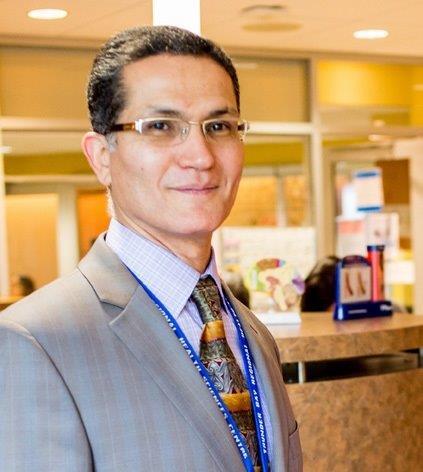Clinician Researchers + NOAMA Grants + Research Institute Support = Better Patient Care
by Marcello Bernardo
 Dr. Ayman Hassan will investigate whether or not HP gas MRI can be used as a non-invasive method of testing for Alzheimer’s disease.
Dr. Ayman Hassan will investigate whether or not HP gas MRI can be used as a non-invasive method of testing for Alzheimer’s disease.Opioid addiction. It’s an epidemic in Northwestern Ontario as it is in many places, and approximately 30% of pregnancies here are to women with an opioid dependency. That has prompted Dr. Naana Jumah, clinician scientist at the Thunder Bay Regional Research Institute and the Thunder Bay Regional Health Sciences Centre, to address the underlying problems and find solutions.
“Part of the challenge is the stigma attached to pregnant mothers struggling with addiction issues,” Dr. Jumah said. “In other words, it’s not just a medical problem, it’s a social problem. That makes it more difficult to find workable solutions.”
Two of Dr. Jumah’s research projects were funded by the Northern Ontario Academic Medicine Association (NOAMA), which distributes grants for local, physician-driven research to improve patient care. In 2015, Dr. Jumah began developing partnerships to build an integrated health delivery strategy for women with opioid dependency during pregnancy in Northwestern Ontario – the first of its kind in Canada. This year, Dr. Jumah and a team of clinician researchers aim to develop a curriculum that addresses the social determinants of Indigenous women’s reproductive health. This is enabling research strategic to the Thunder Bay Regional Health Sciences Centre, including in the area of Indigenous Health.
NOAMA is supporting many clinician researcher projects in the region through funding. But there is an interesting – and exciting – dynamic developing in Northwestern Ontario, thanks to the Research Institute. Our scientists are providing clinicians with research resources and expertise they wouldn’t otherwise have access to.
For example, there are two NOAMA-funded projects by local physicians who are both collaborating with scientist Dr. Mitch Albert, a world-leading expert in hyper-polarized (HP) gas MRI. Dr. Birubi Biman is investigating ways of using the technique to help diagnose and monitor treatment of lung disease. Dr. Ayman Hassan will investigate whether or not HP gas MRI can be used as a non-invasive method of testing for Alzheimer’s disease.
Last year, NOAMA funded research investigating two new cancer treatment techniques, one using magnetic resonance-guided high-intensity focused ultrasound (MRgHIFU) and the other using biomarkers. The results of all these studies could help thousands of people right here in Northwestern Ontario, not to mention millions of people around the world.
Thunder Bay is a truly interdisciplinary environment where biologists, chemists, physicists, engineers and medical doctors work closely together – that makes us unique. It’s created a collaborative research environment that, sparked by funding sources like NOAMA, is igniting local research and enabling true bench-to-bedside breakthroughs for improved patient care in Northwestern Ontario and beyond.